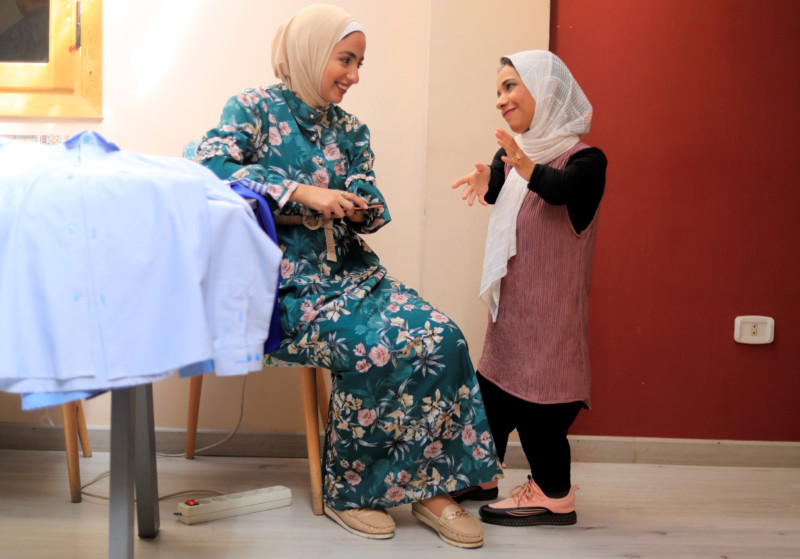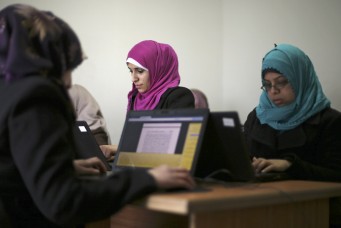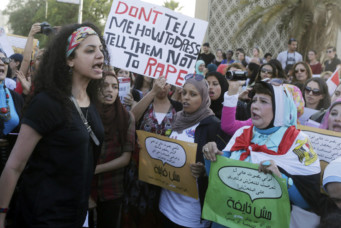Empowering Women with Disabilities for Better Employment Opportunities
The United Nations is working hand in hand with local organizations to provide greater economic prosperity to Egyptian women living with disabilities.

In March 2020, UN Women and the United Nations Industrial Development Organization (UNIDO) launched a Joint Program for the ‘Economic Empowerment of Women for Inclusive and Sustainable Growth in Egypt.’ Among the program’s intended beneficiaries are Egyptian women living with disabilities, who count among the country’s most disadvantaged minorities.
In a webinar entitled Empowering Women with Disabilities for Better Employment Opportunities, policy experts and disability rights advocates came together to discuss the objectives and implementation of that program. The webinar was held as part of the United Nations 16 Days of Activism Against Gender-Based Violence, and hosted by the American University in Cairo’s School of Global Affairs and Public Policy (GAPP).
GAPP Executive Education director Dina Wafa launched the event by presenting the objectives of the Joint Program, which is set to be implemented over five years with support from Global Affairs Canada, and in partnership with local institutions, including the Egyptian Ministry of Trade and Industry and the National Council for Women. Over a period of two years, the GAPP Executive Education, in partnership with Helm and Al Hassan foundations, will provide professional training to 1000 women, of whom 300 are living with disabilities.
UN Women Program Specialist Nora Rafea cited the quality of education provided at AUC and the university’s cooperation with Helm and Al Hassan foundations as the two main reasons for the collaboration, stating, “we wanted to partner up with entities who could reach out to marginalized groups and provide them with quality educational programs. Our priority is quality. We don’t just want to provide training, we want to provide quality training.”
Throughout the discussion, panelists laid out the various challenges faced by differently abled women in the job market and beyond, avenues for their integration into the workforce, and pathways for the creation of more inclusive and accessible work environments.
Obstacles to differently abled women’s employment
“Women with disabilities are doubly marginalized, both as differently abled persons and as women,” explained Parliamentarian and Member of the National Council for women Heba Hagrass. Indeed, Egyptian women living with disabilities face greater educational and employment barriers than differently abled men, or their able bodied counterparts. Surveys find that 82 percent of them are outside the workforce. World Bank statistics further show that differently abled women are ten times more susceptible to gender-based violence, a fact which largely correlates with their economic disenfranchisement.
“The most hindering of obstacles are, ultimately, the barriers that society and job markets place before differently abled persons,” said Amina El Saie, co-founder of the organization Helm, which provides professional coaching services for the inclusion of persons with disabilities in the workplace. The first challenge to differently abled women’s employment, in her view, lies within the hiring process itself. Employers will often reconsider offering work to an applicant after finding out that they are differently abled, especially if the applicant is female and therefore presumed to be bound by more familial obligations. This issue is especially prevalent in the industry sector or in jobs requiring lengthy working hours.
Yet, even those women who do find employment continue to face ample barriers within the workplace.
“A big part of the challenge facing differently abled people is transportation to their workplace,” noted May Zein El Din, founder and CEO of Al Hassan Foundation for Differently Abled Inclusion. Through her work, Zein El Din has learned that finding adequate transportation to and from work can be highly challenging for differently abled employees, who may have to spend more than they earn to cover the cost of their commute. These financial barriers often result in absenteeism or resignation, misleading employers to believe that the employee is unmotivated or uninterested in working.
Furthermore, many workplaces in Egypt are not properly equipped to accommodate people with disabilities, lacking such infrastructure as ramps, elevators, or accessible restrooms which would allow their differently abled employees to navigate their environment with more ease.
And yet, as El Saie notes, women with disabilities may often be reluctant to voice these concerns for fear of being perceived as weak or vulnerable. This, in turn, leads them to turn down opportunities or resign despite possessing adequate qualifications for a given position.
Zeineldin and El Saie’s concerns were echoed by Hagrass, who pointed to low education levels as yet additional structural barriers impeding differently abled women in Egypt. Of the country’s roughly ten million citizens living with disabilities, only 2 percent receive formal education. The resulting high rates of illiteracy, she says, “bar their access to work, and by extension, to dignified living.”
Much of the challenges faced by differently abled women, begin within their own families. “Parents of girls with disabilities are terrified of seeing their daughters exposed to violence, and especially sexual violence,” Hagrass says.
Women living with disabilities are statistically far more susceptible to sexual violence than their able bodied counterparts. Nonetheless, as Hagrass remarked, anxieties surrounding sexual violence often lead parents to restrict their differently abled daughters’ mobility outside the home environment. This means they are less likely to attend school or be allowed to search for employment.
Paving the way toward greater inclusion
Legislation
Though women with disabilities continue to face substantial employment barriers, a number of actors have come together to create a more inclusive and accessible job market.
First among them is the Egyptian legislature. Egypt is party to several international conventions on disability, providing protection to differently abled workers, including minors in the workforce. Law 10/2018 was passed in implementation of these conventions, and under the umbrella of the UN Sustainable Development Goals, in March 2018.
Hagrass, who participated in its writing, explained that the law requires firms employing twenty or more people to ensure that at least five percent of their employees are differently abled. It also provides tax benefits to companies which exceed this standard, while imposing a fine on companies which fail to meet it. The sum of this fine increases the further a company strays from the required number of differently abled employees, and the longer they fail to remedy this gap.
“The focus on small enterprises is especially important,” said Hagrass, explaining that technological progress increasingly allows employers to reduce the number of people working within their companies. “If each of these twenty-person enterprises employs one person with disabilities, there will be infinitely more opportunities for differently abled people,” she added.
Awareness
“Awareness, awareness, awareness,” said Hagrass, noting that greater public awareness is needed to back the above-mentioned legislative efforts.
Though differently abled women’s social and labor rights are protected by Egyptian law, most women’s families are uninformed as to the nature and extent of these protections. Hence their reluctance to allow their daughters to seek education and employment. For this reason, the National Council for Women launched an initiative titled You Are Protected by the Law (Hemaytek fi Kanoonek). The campaign, explained Hagrass, consists of posters and educational materials depicting instances of violence against women with disabilities. Each of the images bears a short caption explaining that legislation protects women from this particular form of violence.
“The point of the campaign is not only to let women know that they are protected by the law, but also to let predators know that they will not get away with harming differently abled women,” she added.
As part of the UN’s 16 Days of Activism Against Gender-Based Violence, the National Council for Women launched a second campaign titled Code of Professional Conduct for the Protection of Women with Disabilities. The purpose of the campaign, explained Hagrass, is to educate professionals about how to deal with colleagues and employees living with disabilities. It is also meant to instruct differently abled people on how to request and obtain the accommodations to which they are entitled in the workplace, and increase their awareness of services available to them.
Of course, no one is better equipped to raise awareness about the challenges facing women with disabilities than differently abled women themselves.
In line with this reasoning, Al Hassan Foundation employs a majority staff of differently abled persons. “We decided to employ differently abled persons in our own organization before reaching out to companies. This allowed us to be better aware of the challenges that these women face,” said founder and CEO Zein El Din, adding that over 70 percent of those working for the organization are people with disabilities, of whom 50 percent are women. Women with disabilities also comprise 50 percent of Al Hassan’s board of trustees.
Helm similarly works to center the voices of differently abled persons in their training programs and awareness campaigns. “Part of this training is activities designed to help people put themselves in differently abled colleagues’ shoes,” explained Al Saie. Throughout those activities, participants are guided by people with disabilities. The purpose of this is to help participants realize that those living with disabilities are just as capable as themselves, and can be in charge of leading and training their able bodied colleagues.
Training and accomodation
Drawing on Al Hassan foundation’s past initiatives, Zein El Din went on to demonstrate how strong awareness campaigns can lay the ground for more hands-on professional training.
Over the past year, the organization found employment for 65 women with disabilities through its Livelihood Project (Mashrou’ Masdar Rizk). Several of these women were hired by partner banks and other companies. Many, however, were not formally educated and therefore lacked the qualifications for this type of work. To remedy this, the women were offered short-term employment within Al Hassan foundation, during which time they received proper training before applying for other opportunities.
The organization also worked to accomodate the needs of women living in remote areas, or those whose disabilities prevent them from pursuing higher education, by helping them to establish small-scale projects in line with their qualifications and interests.
“Some of them cannot pursue higher education, but come from rural areas and are able to work in agriculture. Others have found work selling hand-made textile products. The key is to keep an open mind in order to help each woman find the work that best suits her,” Zein El Din explained.
Rafea echoed the assertion that those looking to generate opportunities for women with disabilities should take into account the particular needs arising from each woman’s circumstances.
“Our methodology for [the Joint Program] is not to look at women as a homogenous group. This is something we learned from our projects conducted over the past ten years. We cannot compare the needs of women in rural and urban areas, nor can we compare those of women living in Alexandria versus Bani Suef. Each region has its peculiarities,” she explained.
Rafae further noted the significant heterogeneity within the differently abled population, and underlined the importance of implementing programs that respond to the needs of people living with different types and degrees of disability.
All participants shared the view that efficient training should not only target women with disabilities, but also equip organizations to accommodate their differently abled employees’ needs.
Rafae noted that one of the Joint Program’s main objectives is to increase companies and employers’ ability to accomodate people with disabilities, saying, “we want to show them that it is not as complicated as they think, they can easily make their environments more accessible to differently abled people.”
Al Saie outlined ways in which Helm is already working towards this objective, stating that “besides the work we do to generate employment opportunities, we also work to equip professional environments to assist and enable professional growth for differently abled people.” Examples of this include creating special units within the Human Resources body of a company, specialized in assisting differently abled employees.
Inclusive, adequately equipped work environments are key to allowing differently abled women equal opportunities for professional development and promotion, added Zein El Din. “If we provide these women and girls with opportunities and avenues for professional growth, they can excel. With the proper support, there is nothing stopping them from finding work in Egypt or even abroad,” she concluded.
Amina Abdel-Halim is associate editor at the Cairo Review of Global Affairs. Her work has appeared in Ahram Online, Al Ahram Weekly, the Cairo Review of Global Affairs, and the Cairo International Film Festival’s Daily Bulletin.
Read More



